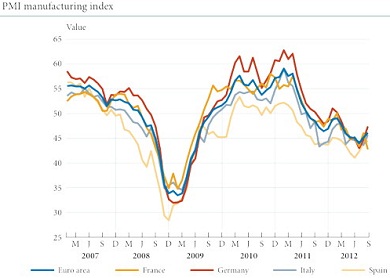The adoption of unconventional monetary measures by the European Central Bank (ECB), such as its programme of Outright Monetary Transactions, has helped to substantially relieve tensions in the sovereign debt markets for some countries.
However, in spite of this greater stability in the financial markets, this has yet to be reflected in the euro area’s better economic performance as a whole. In fact, the decline in economic activity in the third quarter of 2012 is expected to affect not only peripheral countries but also the countries in the centre.
After gross domestic product (GDP) shrank by 0.2% in the second quarter, the most recent leading business indicators point to a similar drop for the third. The index of economic sentiment in September continued its downward trend and stood at 85 points, clearly below its historical average. This fall was caused by weaker confidence in the sectors of services, retail and consumer goods and, to a lesser extent, industry.
Somewhat more favourable was the view of entrepreneurs in construction, who were less pessimistic than in August. Similarly, the purchasing managers’ index (PMI) for manufacturing increased in the month of September, reaching a value of 46.1 points, its highest figure in 6 months. Nonetheless, this index is still below 50 points, the value as from which there is usually a contraction in activity.
Demand indicators for the third quarter are also showing signs of weakness. Consumer confidence fell between June and September by more than 6 points, reaching levels similar to those of June 2009. On the other hand, retail sales offered some respite as they were up by 0.1% in the month of August, with their contraction in year-on-year terms standing at -1.3%. Of note was the month-on-month rise in sales in countries such as Luxembourg (2.9%), Portugal (2.8%), Slovenia (2.2%) and Spain (2.1%), the latter probably due to purchases being brought forward before the expected VAT hike.
Within this context, the last World Economic Outlook of the International Monetary Fund (IMF) for October revised downwards its GDP growth forecasts by 0.1 percentage points for 2012 to -0.4% and by 0.5 percentage points for 2013 to 0.2%. This report identifies the euro area as the main source of weakness in the global economy and therefore urges European leaders to implement the agreed policies as soon as possible in order to achieve greater economic and financial integration. In fact, the IMF warns that the most immediate risk is still tardy or insufficient political agreement, which could make the euro area crisis worse.
In short, the capacity of European leaders to resolve the sovereign debt crisis effectively will be a decisive factor in achieving a gradual recovery in economic activity in 2013. With a view to the future, it’s crucial to lay the foundations for a more integrated economic, fiscal and financial union that can withstand shocks. Only then can we expect balanced, sustained economic growth over the long term.







Be the first to comment on "The downward trend continues in the EU"